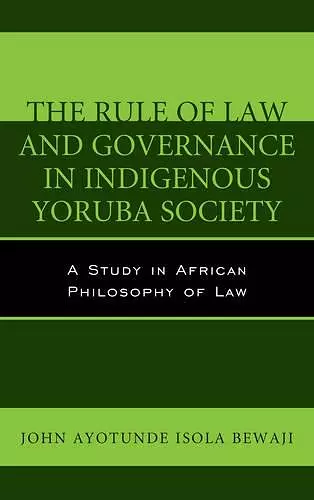The Rule of Law and Governance in Indigenous Yoruba Society
A Study in African Philosophy of Law
John Ayotunde Isola Bewaji author
Format:Hardback
Publisher:Lexington Books
Published:22nd Aug '16
Currently unavailable, and unfortunately no date known when it will be back

In The Rule of Law and Governance in Indigenous Yoruba Society, John Ayotunde Isola Bewaji has two main goals. The first is to provide an exploration of aspects of indigenous Yoruba philosophy of law. The second is to relate this philosophy of law to the Yoruba indigenous traditions of governance, with a view to appreciating the relevance of the Yoruba traditions of law and governance to contemporary African experiments with imported Western democracy in the 21st century. This book is devoted to what can be described as a juridical forensic investigation of Nigeria’s predicament of developmental deficit, leading to gross and unconscionable impoverishment of large segments of the population, in the midst of so much natural resources and abundant human capital, using Yoruba indigenous legal traditions as reflective template. Bewaji urges that Africa has to take seriously the necessity of obedience, observance, enforcement and operation of law as no respecter of persons, groups, affiliations and pedigrees as was in the case in the societies founded by our ancestors, rather than the present scenario whereby the highest bidder procures semblances of justice from a crooked system of common law which was never designed to be fair, equitable and just to the disadvantaged in society.
John Bewaji’s The Rule of Law and Governance in Indigenous Yoruba Society grounds legal philosophy inescapably within its cultural context, contrary to conventional Western legal philosophy that, in the name of reason or science, is deceptively projected as culture-free. The book makes significant contribution to the decolonization of legal philosophy and ought to be read by every serious student of legal Philosophy. Although the book focuses on legal philosophy in the Yoruba community, it has relevance to legal philosophy in other African communities and beyond. Like other African communities, the Yoruba community has been the victim of epistemicide—a term Bewaji uses to describe systematic eradication of indigenous knowledge systems. According to Bewaji, indigenous Yoruba culture has a basis for generating a sound foundation for law and its rule. There is no need to wait for foreign missionaries to provide legal philosophy. Furthermore, because of its connection with governance, indigenous Yoruba notion of law and its rule provide a criterion for good governance. Bewaji articulates this criterion to critique governance in Nigeria today and, by extension, governance in Africa. He uses the same criterion to challenge the legal philosophy that the liberal Western modernity has attempted to impose on Africans. His book is worth the attention of those who have an interest in exploring modern juridical encounter between Africans and Westerners, and those who are interested in successful governance in Africa. -- John Murungi, Towson University
ISBN: 9781498518376
Dimensions: 235mm x 158mm x 26mm
Weight: 603g
288 pages